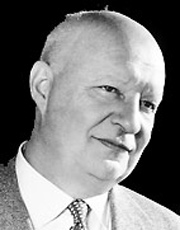
Paul Hindesmith
When Lilacs last in the dooryard bloom’d
(Requiem for those we love)
Paul Hindemith, composer
David Hoose, conductor
Boston University Symphony Orchestra | 2013
TEXT EXCERPTED FROM:
BU Today | Source
Commissioned in the wake of President Franklin D. Roosevelt’s death, composer Paul Hindemith’s 1946 work When Lilacs Last in the Dooryard Bloom’d (A Requiem for those we love) was based on the poem of the same title by the consummate American poet Walt Whitman. In setting to music Whitman’s poignant elegy for slain President Abraham Lincoln, the German-born Hindemith created what critics hailed as a profoundly American work. The BU Symphony Orchestra and Symphonic Chorus will perform the work tonight at Boston Symphony Hall, along with Charles Ives’ haunting Decoration Day, in the second of the College of Fine Arts two annual performances at the famed concert hall.
A stirring memorial to Roosevelt, who had worked tirelessly to ensure Allied victory in World War II, the composition was a labor of love for Hindemith. The composer had fled his native country in 1938 after the Nazi party condemned his modernist compositions as “degenerate.” Requiem was commissioned by conductor Robert Shaw (Hon.’94) just after FDR’s death in April 1945 and premiered a year later, with Shaw conducting.
In Requiem, Hindemith compressed Whitman’s 16-stanza poem into 11 movements for full symphonic chorus and orchestra, with the poet’s voice sung by a solo baritone. “Many years ago my mother told me the story of how she just broke down and wept as a young girl when FDR died,” says James Demler, a CFA assistant professor of music, who will sing the baritone solo. “When Hindemith was asked to write this music, it was with both Lincoln and Roosevelt in mind, and it was about how the nation was so deeply affected by those deaths. I’ll try not to lose sight of that when in performance.” Demler’s arias, some very complex, will be interwoven with that of mezzo-soprano Penelope Bitzas, a CFA associate professor of music, in the role of a thrush. In the poem Whitman implores the bird to “sing on, sing on” what he calls “death’s outlet song of life.”
“There’s a kind of nobility and melancholy within the text,” says David Hoose, a College of Fine Arts professor of music and orchestral conducting and director of orchestral activities, who will conduct the concert. “Throughout his Requiem, Hindemith, who died in 1963, captured the spirit that America aspired to at the time, and still aspires to today,” a “heartiness and sturdiness” that is reflected in Whitman’s poetry.
Collected from Boston University on Vimeo | Link to Source

